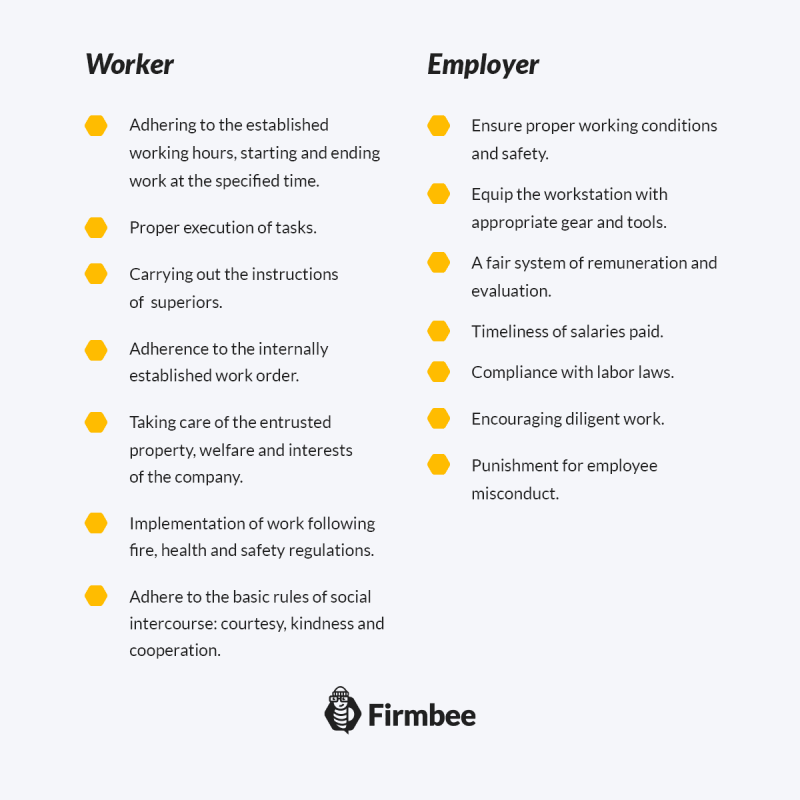Employee discipline is a broad concept, regulated by legal acts and internal regulations. At the time of admission to work, a new employee has to acknowledge the rules and applicable norms. Signing the relevant document by workers means recognizing responsibility for their labor actions. The legitimacy of implementing discipline is obvious. The organization, to function smoothly, should define a code of conduct its employees should conform to. Any deviation from the norm should be corrected, and in extreme cases, consequences should be drawn.
The importance of employee discipline – table of contents:
- The essence of employee discipline
- Discipline obligations of employees and employers
- Methods to ensure discipline
- Summary
The essence of employee discipline
Employee discipline is related to the quality and timeliness of work tasks performed. It is the totality of employee duties, the improper performance of which may result in the imposition of certain restrictions. An employee’s duties are defined by the job description, contract, regulations and organizational charts and laws.
There are objective and subjective aspects associated with work discipline. The objective ones refer to the established norms and rules operating in the organization. The subjective ones, on the other hand, are expressed in the individual attitude of employees to respect discipline. The observance of discipline is influenced by such factors as awareness of the rule of law, work habits, a sense of community and shared responsibility, the appraisal and reward system, the effectiveness and adequacy of the punishments applied.
Discipline obligations of employees and employers
The following columns show the discipline obligations of both employees and employers.

Methods to ensure discipline
To maintain employee discipline, organizations can use the method of encouragement and/or punishment. Encouragement involves publicly expressing appreciation for the quality and creativity of the work performed by a particular employee or task team. The incentive should go with a special reward: a bonus, a valuable gift, public praise, a diploma or nomination for the best employee of the month. Internal regulations or other applicable organizational acts should catalog various incentives should and every employee should get familiar with them. Awareness of receiving an award has a motivating effect, boosts employee morale, and encourages compliance with work discipline.
The second method of ensuring discipline is to punish violations. Before determining the penalty for misconduct, the employer should specifically examine all the circumstances, in particular whether it was an intentional or unconscious act on the part of the employee. Depending on how serious the violation of discipline was, then the employer can apply:
- Verbal warning – in the case of a minor violation, usually resulting from oversight. For example, an employee had to send dozens of parcels in one day, through inattention and a flurry of work he misaddressed one of them. This resulted in the return of the package and the charging of additional costs. The employer, taking into account previous commitment and conscientiousness, decided only to give a verbal warning and pay attention to eliminate similar mistakes in the future.
- Fine – imposed in the event of a major violation of discipline. The amount of the penalty depends on how much the employee violated the rules. For example an accounting employee, through oversight, failed to pay taxes for several employees promptly, as a result, penalty interest was charged by the office. Therefore, the employer decided to fine by taking away 10% of the worker’s salary.
- Written reprimand – in case of willful culpability. This is usually a warning with an entry in the file, a warning of disciplinary dismissal. Example: An employee was caught stealing a few office supplies (half a risk of photocopy paper and several pens). He explained that his child had to bring these materials to school, which he would not have time to buy after work. After reviewing the case, the employer decided to reprimand him, with an entry in his file. He accepted his explanation, but the theft was undisputed.
In the case of serious violations of discipline, an employee may be dismissed with immediate effect. This applies to gross misconduct, knowingly and intentionally committed, such as working under the influence of alcohol (intoxicants), intentional destruction of property, theft, starting fights and brawls, and leaving (abandoning) work without justification.

Summary
The fundamental purpose of observing employee discipline is to ensure uniformity, continuity and efficiency of work. It is the right conduct of actions that enforces the desired behavior of organizational participants, which enables proper planning and forecasting. In addition, it ensures smooth cooperation at the internal and external levels of the enterprise. It determines labor productivity and improves quantitative and qualitative indicators.
Read also: Job redesign methods – 8 advantages of job rotation
If you like our content, join our busy bees community on Facebook, Twitter, LinkedIn, Instagram, YouTube, Pinterest.
Author: Nicole Mankin
HR manager with an excellent ability to build a positive atmosphere and create a valuable environment for employees. She loves to see the potential of talented people and mobilize them to develop.


















